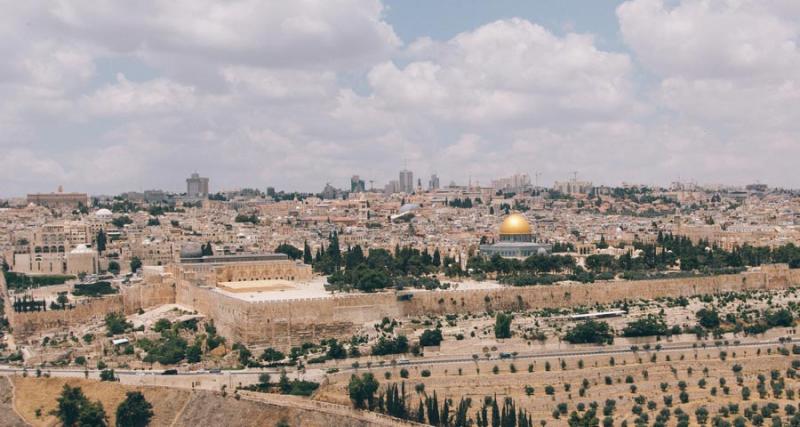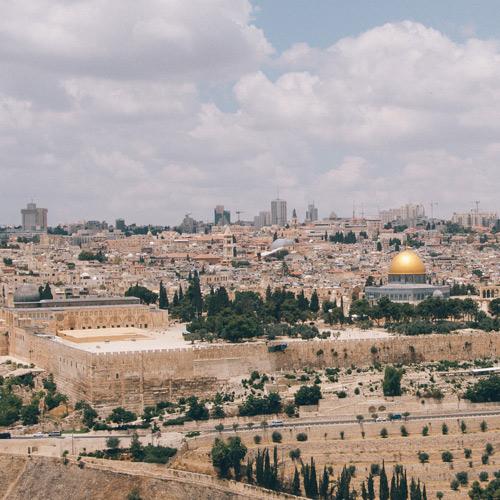Visiting the city of Jerusalem for the first time is, without a doubt, an exciting and unique experience – unforgettable, actually.

Ancient times come alive as you approach the walls of the Old City at the bottom of Jaffa Street. You might ask yourself, “How did they get those big stones one on top of the other?” The same question arises as you overlook the remnant of the Temple outer wall – known as the Western Wall.
A loose translation of Psalm 122:3–4 describes this city as something that is “crammed together.” Yes, there is a sense of coziness at best – some would say crowding – as you walk through the Old City where Jews, Arabs, Orthodox Christians and Christian Armenians all share life within the walls.
Because of possible conflicts or dangers of hostility, IDF soldiers are also a common sight. Outside, life has sprawled in all directions, with many kinds of people groups living in close quarters.
But experiencing Jerusalem for a few days on a tour or even a week or two as a visitor doesn’t come close to revealing what it is to live in the city as an Israeli. The novelty of the ancient environment soon slips into the background of your life as you go about your daily business.
Buses, the light rail, taxis and walking are the main forms of inner-city transportation. Yes, there are plenty of cars, but that is an expensive venture – not just the cost of the car but also paying for parking, not to mention gas (or delek).
It’s a rare convenience to have a car to drive out of the city or down the hills to the beach in Tel Aviv. That trip takes about an hour, if there’s no traffic. In another direction, the Dead Sea is only about an hour away. But in the city, it’s best to keep it simple and easy on the wallet by using public transport.
Jerusalem is, to be sure, a crowded – and often tense – city. You must become accustomed to constant crowds, stares and even pushing. Public transportation is an opportunity to meet the diverse population of Jerusalem.
Although there are many Israelis who do not announce their religious choice through their dress, many do. On the bus or light rail, you’re likely to see men of many ages dressed identically in long black robes, wearing hats and sporting curls on each side of their faces – where you might have seen trendy sideburns in the 1960s.
Anywhere you go, you’ll notice various “kippahs,” which you might know better as yarmulkes (pronounced yah'-muk-ahs), each designating a specific denomination or sect of Judaism. There are women with head coverings – scarves and shiny wigs. Arab Muslim women are covered head to toe, usually with a synthetic fabric, likely to leave you wondering how they survive the summer temperatures.
Some Jewish women wear more fashionable head wraps. The current style is to wear a larger doughnutshaped structure under the head-covering that adds height, with an abundance of fabric, resulting in a sort of high-rise balanced on the top of the head.
You’ll see priests dressed all in black and some nuns in a more modern outfit, while others still wear the traditional habits. And everywhere there are beards and more beards. Trendy young men, priests, Orthodox Jews and Muslims all sport beards.
As a Messianic Jew or a Christian, you probably will be looking for a place of worship. Unlike in the U.S., you’re not going to find a “church on every corner.” There are no presentation boards telling the passing public when the next meeting is and the name of the upcoming sermon. There are places of worship (kehilot as they are called in Hebrew), but you find them by looking on the internet or learn of them by word of mouth.
Jerusalem is known as a magnet for people who feel strongly that their religion defines them. People who have grown up in the city feel they need to be differentiated from the other religions surrounding them. For about 90 percent of those living in Jerusalem, personal identity is rooted in religion.
By contrast, in Tel Aviv, the atmosphere is very different. This city by the beach is notable for having more of a give-and-take attitude. Religion is not so dominant. There is more of a sense of acceptance for who you are. A taxi driver who lives in Jerusalem but prefers to work in Tel Aviv described this by saying that Jerusalemites are more “violent” about who they are and to what group they belong. Nevertheless, there is much interaction between Israeli Arabs and Jews, with the obvious political conflicts taking a back seat to the business at hand.
In this sixth edition in the Confessing the Hebrew Scriptures series: El Shaddai, God Almighty, you’ll meditate on inspiring verses describing our sustaining Almighty God. This encouraging volume contains Old and New Covenant verses written in English, Hebrew and the transliteration from Hebrew.
So, in this context, it is a challenge for Believers to come to the “Holy Land” and not understand why they can’t be as openly evangelistic as they want to be. It doesn’t really work well to open with, “Hey, come here; let me tell you about Yeshua!” It is a slow and steady process to explain the Gospel to a stubborn population.
So how does a city like Jerusalem with such a varied population carry on its day-to-day activities in relative peace and goodwill? Despite their own fierce adherence to their religions and identities, people here are, at the same time, tolerant and even sensitive to others around them.
But it’s important to remember that Israel is not a Christian country. You have to be Jewish to have Israeli citizenship. That means you can’t simply buy a plot of land and build a church building. And sometimes when Messianic Israelis want to rent a space for worship, they – as well as the landlord – will be threatened by ultra religious Orthodox groups. The result is often that the property is not available to them for rent.
Street evangelism is not really recommended. It can easily result in a big fight with the ultra-Orthodox not holding back in their demonstrative objections. You see, Israel is seen by Jewish people, at large, as the one place they can live and have a right to their religion without a threat from the outside world. Indeed, some have come just to get away from Christianity.
No description of life in Jerusalem is complete without mentioning the constant economic pressure that faces all people groups. To put it simply, Jerusalem is a city with the salaries of Detroit and the expenses of Manhattan! A simple falafel (a non-meat street food) costs about $5-6 – and that is before buying a drink. There is no free parking, and city fines are levied frequently and efficiently.
People really struggle here, as elsewhere in Israel, with the high cost of apartment rents. With all the crowdedness in the city, outer neighborhoods have been built, but they, also, are very expensive.
If you are single and living in Jerusalem, be prepared to have a roommate until your dying day! And you’ll probably not live in the main part of town. The days of buying an apartment in central Jerusalem are just about over. The result of these struggles is often exhaustion, but a true Israeli knows how to handle all this and still laugh.
Until the move of the American Embassy to Jerusalem became a major news story, many around the world did not realize that Jerusalem is the capital of Israel. Tel Aviv was never the capital! Israeli government is centered in Jerusalem, which is also home to the Dead Sea Scrolls, as well as the address of the Holocaust Museum and the large Israel Museum with its many exhibitions.
A most beautiful and interesting event in Jerusalem is the summer light show, which takes participants through the Old City to view compositions, sculptures and performances. It’s one event that brings all residents together. As people chatter and parents call to their children, you will hear an abundance of languages. While there are many mother tongues in the city, Jerusalem is also a city where English is very commonly spoken, which visitors enjoy. Children start learning English by third grade, so many young Israelis speak English fairly well.
Jerusalem is its own world, full of tension, religions, work, and of course, the Israeli/ Palestinian situation. That topic alone could fill an entire book. But it is definitely a city with a spiritual presence, as anyone spending time there seems to notice; it is woven together into a sturdy fabric that only God may fully understand.






